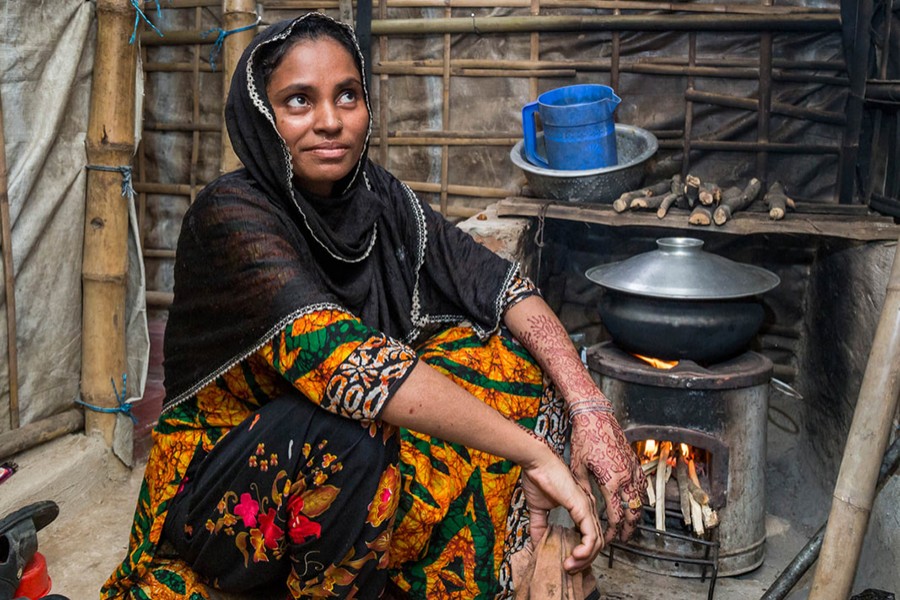A 50-year-old Hasna Begum passes her days through babysitting grandchildren. This woman from Baipail area of Savar – who singlehandedly managed all sorts of household works for a family consisting of eight members – has retired from cooking since the arrival of her daughter-in-law. However, she still cooks and cleans for her large family occasionally, if her daughter-in-law is sick or on a visit to her father’s home.
“Taste or quality – nothing is good if food is prepared by a housemaid,” says Mrs Hasna with a smile, when asked whether she thought of a domestic help. “Also, a housemaid costs a lot nowadays. It’s better to work by self,” she adds.
As she mentions ‘cost’ in her conversation, things make much more sense. She has the traditional sense of economic savings for her family that most women from middle or lower middle income families have. And that’s not mere economy, that’s care economy -- the most overlooked thing in our society.
What’s care economy?
All types of activities or services stemmed out of care, including that of Mrs Hasna Begum who takes responsibilities on her own caring for the family, are careworks. And the care work that has some sort of economic value is a part of the care economy.
Think about how much homemakers like Hasna Begum save year after year by their careworks free of cost. Unfortunately, these careworks are never recognised and deemed as women’s natural duties. Hence, unpaid and underpaid care work has always been a driver of inequality, as it is the women who mostly remain unpaid for their careworks.
Disparity
According to the International Labour Organization (ILO), women perform on average 76.4 per cent of the total amount of unpaid care work globally. There is not a single country with an equal gender share of unpaid care work to date. Across all regions and countries, women do more unpaid care work than men throughout the life course. The ILO estimates that women’s contribution to all types of care work, if taken into account properly, would reach a staggering US$11 trillion!
This disparity in the burden of unpaid care work is more vivid in Bangladesh. A study, by ActionAid Bangladesh, shows that women spend five times more time on unpaid household chores than men. According to South Asian Network on Economic Modeling (SANEM), 81.4 per cent of the total unpaid care work done in Bangladesh is done by women.
Aggravated by Covid-19
The Covid-19 pandemic has driven the care economy deeper into crisis mode worsening the gender inequalities for women. Extended school closures due to lockdown, overwhelmed health systems, and housework and care responsibilities for the young, old and sick have multiplied the load on care systems and increased women’s paid and unpaid work hours.
Elderly people who are at greater risk of falling severely ill if infected by Covid-19 mostly live with their children in Bangladesh. Due to societal gender assigned roles, women are mostly taking the responsibility of caring for them.
Rumman Khandaker, a newly appointed physician in the BCS Health Cadre this year, pondered a lot on her decision to join as a medical officer at Naniarchar, Rangamati hill district. “All my family members live in the city and we all recovered from Covid-19 a few days back. I was very uncertain whether I will be able to join work at such a remote place when my child is still so little,” she explained. “How am I supposed to be working with all the child care facilities constricted due to the lockdown?”
Luckily for Rumman, her family members are supportive and her brother went there with her. However, not all working mothers are lucky as her.
Most of the working women struggle to keep a balance between their paid and unpaid works; needless to mention that they mostly have to give more time to unpaid works.
Whenever a family crisis comes, it is always women who sacrifice their comfort. This pandemic has put many families in crisis and Maher Nusrat’s family is no exception. This family from Kalabagan area of Dhaka hasn’t hired any domestic worker since the beginning of the pandemic for financial ease. And no wonder, all the work that was previously done by the housemaid has now become her sole responsibility.
“My back hurts as I have to do everything alone. At least these works are valued and compensated when done by domestic workers. But now I am carrying out all these chores for free without any help or recognition.”
Bangladesh entered the pandemic on the shaky foundations of gender inequality caused by an uneven distribution of care work. It is feared that this arrangement of ‘all work and no pay’ and the struggle to reconcile family and work responsibilities may increasingly worsen the conditions for women who continue to participate in the labour market and have a direct and negative impact on women’s income and enjoyment of rights.
The need to value the care economy to tackle gender equality is so important that it has already been acknowledged in the United Nations Sustainable Development Goal-5. To prevent further deepening of gender inequality, it is necessary to take into account the additional unpaid care burden placed on women and families during the Covid-19 pandemic.
Rahnuma Binte Rashed is a BBA student at the Institute of Business Administration, the University of Dhaka.


